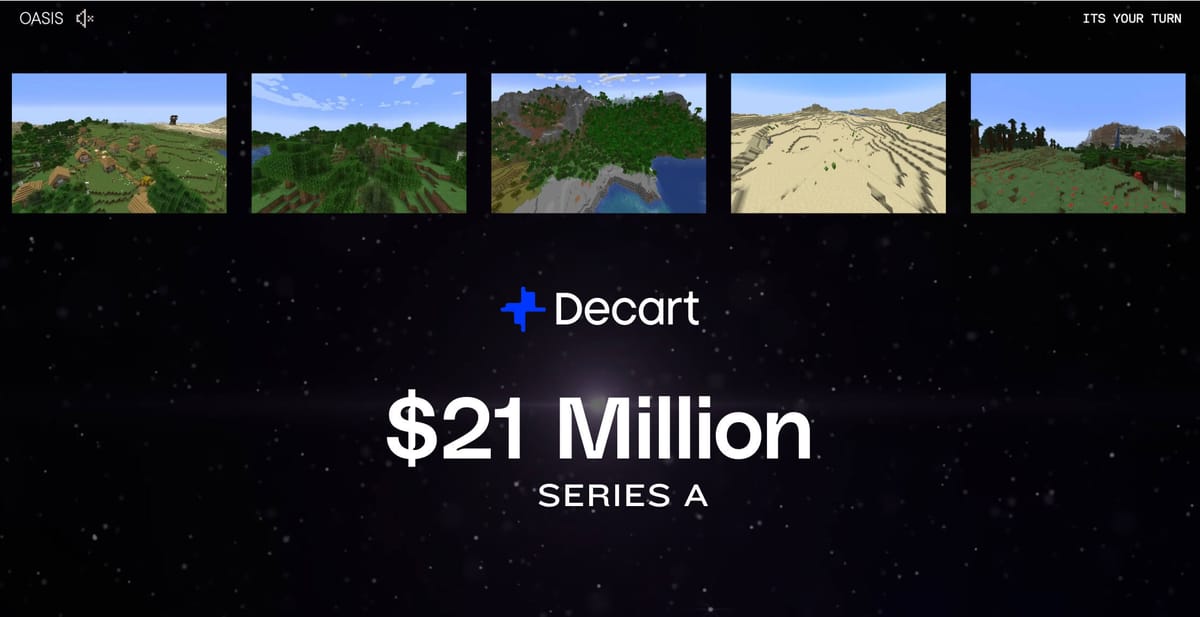
Take a moment and imagine playing a video game where every element – from the terrain to the physics – is generated in real-time by AI. That's what AI startup Decart dropped today with Oasis, which the company is calling the first playable, real-time open-world AI model. Alongside this demo, Decart announced $21 million in seed funding led by Sequoia Capital, with participation from Zeev Ventures.
Unlike traditional game engines, Oasis directly processes user inputs like keyboard and mouse movements to simulate gameplay, including physics, graphics, and environment, all without relying on pre-coded scripts. Decart sees Oasis as the first step toward creating AI models capable of building and running interactive worlds autonomously, ultimately replacing traditional game engines.
Developed in partnership with Etched, the demo shows how users can interact with an AI-generated world in real time. The game model takes inspiration from Minecraft—players can jump, collect items, and break blocks, all dynamically generated in response to their actions.
Oasis relies on a combination of transformer models and diffusion training, the same fundamental technology behind large language models. The model uses an approach that generates each frame in an autoregressive fashion, conditioned on the previous frames and the user's input, creating an experience that feels interactive and alive.
The core breakthrough is in the advances Decart made in model architecture and inference technology, which allow Oasis to handle the complexities of real-time gameplay with minimal latency. Their proprietary inference framework also plays a crucial role, allowing Oasis to deliver real-time video generation, running on NVIDIA H100 GPUs.
The demo does reveal some current limitations of the technology. The generated environments can appear hazy, and the model sometimes "forgets" the layout of previously generated areas when you turn around. All things that the company is already working to address.
Still, cost remains a significant barrier for deploying such AI models at scale. However Etched's upcoming Sohu AI chip promises to run the same model at 4K resolution while serving ten times more users at the same cost as current solutions.
We @sequoia are thrilled to announce our investment into @DecartAI
— Shaun Maguire (@shaunmmaguire) October 31, 2024
Today they’re launching a “warm-up” called Oasis
This is a fully playable version of Minecraft WITH NO GAME ENGINE, it’s purely a video model rendering pixels in real time pic.twitter.com/pj8AKYEpCC
Dean Leitersdorf, co-founder and CEO of Decart, says the goal is to create a new era of generative experiences, where AI can power fully interactive environments. "With this new funding, we take our vision to the next level – doubling down on our business momentum and technical expertise to usher in a new era of generative experiences and unlock possibilities that were once only imagined," said Leitersdorf.
For example, beyond gaming, Decart and Etched believe that models like Oasis could be used in various contexts where interactive video is needed, such as entertainment, educational tools, or even AI-driven creative media. The company imagines a future where users can create and interact with virtual worlds guided by nothing more than a prompt, allowing AI to dynamically generate content, including terrain, characters, and even storylines.

